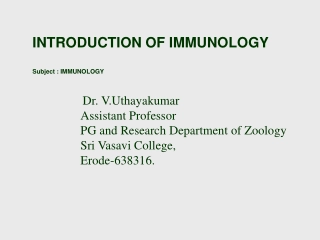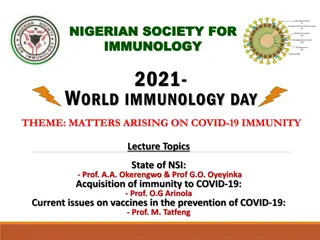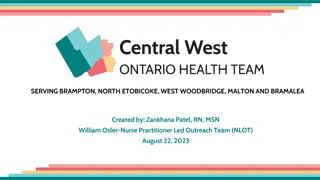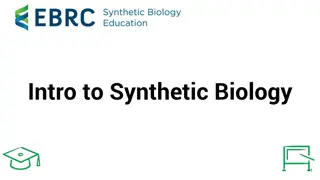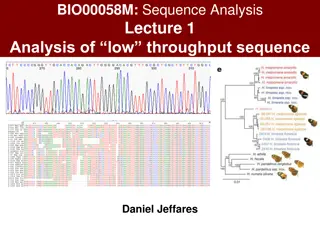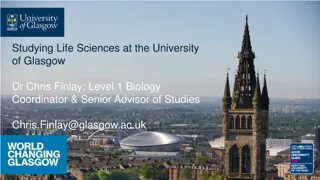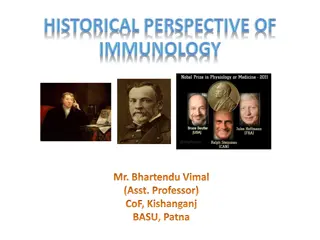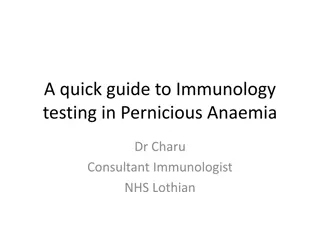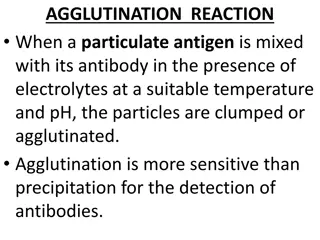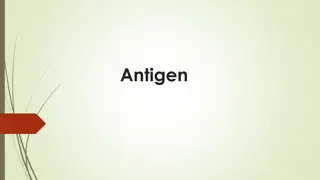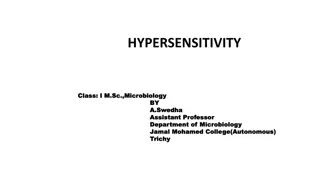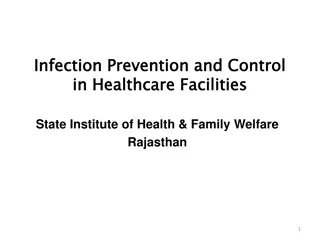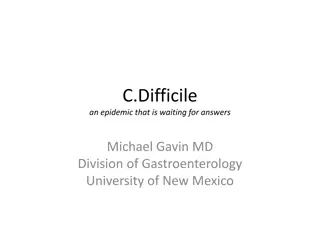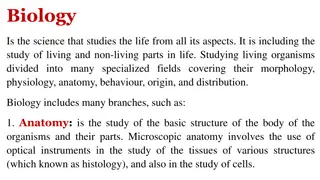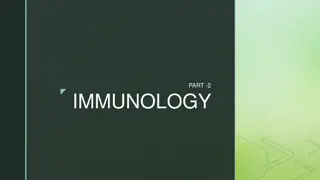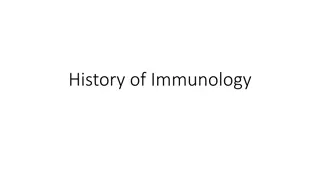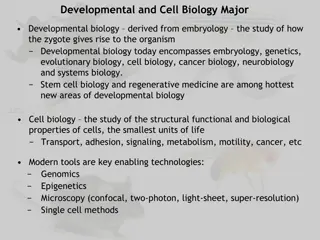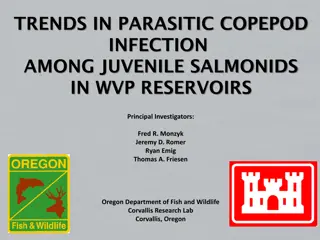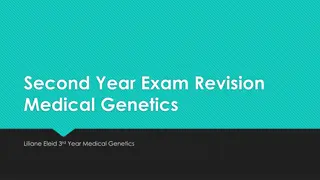Master's Program in Infection Biology and Immunology at University of Greifswald
The Master's Program in Infection Biology and Immunology at University of Greifswald offers a comprehensive curriculum with access to state-of-the-art facilities and institutes such as the Friedrich-Loeffler-Institut and the Helmholtz Institute for One Health. The program includes working groups in various disciplines like molecular genetics, bioinformatics, and immunology. The examination board is comprised of esteemed faculty members and student representatives. Academic advising is available at the Center for Functional Genomics of Microbes. For more information, contact the department office or the academic advisor directly.
Download Presentation

Please find below an Image/Link to download the presentation.
The content on the website is provided AS IS for your information and personal use only. It may not be sold, licensed, or shared on other websites without obtaining consent from the author.If you encounter any issues during the download, it is possible that the publisher has removed the file from their server.
You are allowed to download the files provided on this website for personal or commercial use, subject to the condition that they are used lawfully. All files are the property of their respective owners.
The content on the website is provided AS IS for your information and personal use only. It may not be sold, licensed, or shared on other websites without obtaining consent from the author.
E N D
Presentation Transcript
M.Sc. Infection Biology and Immunology Information for New Students
Participating Institutes & Facilities at the University Institute of Genetics and Functional Genomics at C_FunGene Department of Molecular Genetics and Infection Biology (UG) Department of Functional Genomics (UMG) Institute of Microbiology at C_FunGene (UG) Working groups at the Institute of Biochemistry (UG) Helmholtz-Institute for One Health (HIOH) Institute of Mathematics and Computer Science (UG) Institute of Bioinformatics (UMG) Institute of Physics (UG) Institute of Pharmacy (UG) UG = University of Greifswald UMG = University Medicine Greifswald FLI = Friedrich-Loeffler-Institut HIOH = Helmholtz Institute for One Health
Participating Institutes & Facilities at the University Institutes & Working Groups at the Friedrich-Loeffler-Institut (FLI), island of Riems Institute of Molecular Virology and Cell Biology Institute of Immunology Institute of Infectology Institute of Novel and Emerging Infectious Diseases Institutes, Clinics and Departments at University Medicine Greifswald (UMG) (selection) Institute of Immunology Institute of Medical Microbiology Clinic for Internal Medicine A and Clinic for Internal Medicine B Institute of Bioinformatics Institute of Ethics and History of Medicine UG = University of Greifswald UMG = University Medicine Greifswald FLI = Friedrich-Loeffler-Institut HIOH = Helmholtz Institute for One Health
Examination Board Infection Biology and Immunology Prof. Dr. Sven Hammerschmidt (UG) Prof. Dr. Stefan Finke (FLI) Prof. Dr. Barbara Br ker (UMG) Dr. Thomas Kohler (academic advisor) (Student representatives)
Examination Board Department Office Ms. Mary Doktorowski Friedrich-Ludwig-Jahn-Stra e 15 Tel.: +49 3834 420 4150 mary.doktorowski@uni-greifswald.de
Academic Advisor Center for Functional Genomics of Microbes (C_FunGene) Dr. Thomas Kohler Department of Molecular Genetics and Infection Biology, Institute of Genetics and Functional Genomics, C_FunGene Felix-Hausdorff-Stra e 8 +49 3834 420 5713 (or 5724) [consultation hours] thomas.kohler@uni-greifswald.de
Degree Course Outline The following course contents must be completed: Core modules (CM) Semester 1 Core modules (CM) Semester 2 Advanced modules (AM) Work placement Advanced modules (AM) Semester 3 Research practical Semester 4 Master s dissertation + defence
Degree Course Outline The following course contents must be completed: Semester 1 5 Core modules (CM; in total 36 ECTS) Objective: Consolidation of theoretical and practical knowledge gained in undergraduate classes; requirement for attending advanced modules At least 3 advanced modules (AM; 6 or 12 ECTS) Objective: In-depth contents on the theory and practice of specific topics, advancing basic knowledge gained in the core modules: 13 advanced modules on offer Semester 2 Semester 3
Degree Course Outline The following course contents must be completed: Work placement module (7 weeks, 10 ECTS) Objective: Gaining of experience in possible fields of future occupation; to be organised independently by the students 4-page report Semester 2 Research practical module (4 weeks, 8 ECTS) Objective: Theoretical/practical preparation of the master s dissertation 8 to 10-page report Semester 3 Master s dissertation + defence (writing-up period: 6 months, 30 ECTS) Objective: Independent work on a current scientific question; writing-up and evaluation of the results, oral presentation with discussion Semester 4
Sample Study Plan Example 1 L = Lecture S = Seminar PL = Practical lab course EX = Exercises ECTS = Credits according to the European Credit Transfer System ID Module Name Classes ECTS TE/SA C Semester CM1 Basics in Infection Biology L, S, PL 8 WE60 Pr20*, R, CA* WiSe CM2 Immunology L, S, PL 8 WE60 Pr20*, R, CA* WiSe CM3 Introduction to OMICs Technologies L, S, PL / CE 8 WE60 PP / CE, Pr20*, CA* CA*, 1 test WiSe Type of Examination (TE) WE = Written examination OE = Oral examination 60 = 60 min 30 = 30 min CM4 Applied Data Science 2 EX 6 WiSe / SuSe CM5 Key Competences 4 L, EX 6 WE60 / OE30 WE60 R, CA* WiSe AM1 Molecular Infection Biology 2 L, S, PL 12 R, Pr20*, SuSe CA* R, Pr20*, Coursework (C) Pr = Presentation R = Report CA = Confirmation of attendance PP = Poster presentation CE = Coursework essay p = Pages 20 = 20 min AM3 Molecular Virology and Cell Biology L, S, PL 12 WE60 / OE60 SuSe CA* R, Pr20* / CE*, AM5 Infection Immunology 2 L, S, PL 12 WE60 WiSe CA* R (8-10 p) RP Research Practical PL 8 WiSe / SuSe WP Work Placement WP 10 R (4 p) WiSe / SuSe MD 30 MD WiSe / SuSe Master s Dissertation MD = Master s dissertation
Sample Study Plan Example 2 ID Module Name Classes ECTS TE/SA C Semester L = Lecture S = Seminar PL = Practical lab course EX = Exercises ECTS = Credits according to the European Credit Transfer System CM1 Basics in Infection Biology L, S, PL 8 WE60 Pr20*, R, CA* WiSe CM2 Immunology L, S, PL 8 WE60 Pr20*, R, CA* WiSe CM3 Introduction to OMICs technologies L, S, PL / CE 8 WE60 PP / CE, Pr20*, CA* CA*, 1 test WiSe CM4 Applied Data Science 2 EX 6 WiSe / SuSe Type of Examination (TE) WE = Written examination OE = Oral examination 60 = 60 min 30 = 30 min CM5 Key competences 4 L, EX 6 WE60 / OE30 WE60 R, CA* WiSe AM2 Host Genetics in Infectious Diseases 2 L, S, PL 12 R, Pr20*, CA* SuSe AM4 One Health und Antimicrobial Resistance L, S, PL 6 WE60 R, Pr20*, CA* WiSe Coursework (C) Pr = Presentation R = Report CA = Confirmation of attendance PP = Poster presentation CE = Coursework essay p = Pages 20 = 20 min AM6 Clinical Module 2 L, S, PL 12 WE60 P, Pr20* or CE*, CA* SuSe AM1 1 RP Metabolomics in Infection Research L, S 6 WE60 Pr20*, CA* SuSe Research Practical PL 8 R (8-10 p) WiSe / SuSe WP Work Placement WP 10 R (4 p) WiSe / SuSe MD = Master s dissertation MD 30 MD WiSe / SuSe Master s Dissertation
Sample Study Plan Example 3 L = Lecture S = Seminar PL = Practical lab course EX = Exercises ECTS = Credits according to the European Credit Transfer System ID Module Name Classes ECTS TE/SA C Semester CM1 Basics in Infection Biology L, S, PL 8 WE60 Pr20*, R, CA* WiSe CM2 Immunology L, S, PL 8 WE60 Pr20*, R, CA* WiSe CM3 Introduction to OMICs technologies L, S, PL / CE 8 WE60 PP / CE, Pr20*, CA* CA*, 1 test WiSe Type of Examination (TE) WE = Written examination OE = Oral examination 60 = 60 min 30 = 30 min CM4 Applied Data Science 2 EX 6 WiSe / SuSe CM5 Key competences 4 L, EX 6 WE60 / OE30 WE60 R, CA* WiSe AM7 Pathophysiology and Molecular Adaptation of Microbes Functional Genomics L, S, PL 12 Pr20*, R, CA* SuSe Coursework (C) Pr = Presentation R = Report CA = Confirmation of attendance PP = Poster presentation CE = Coursework essay p = Pages 20 = 20 min AM9 3 L, S, PL 12 WE60 Pr20*, R, CA* SuSe AM10 Biotechnology and Biophysics L, S, PL 12 WE60 R, Pr20*, CA* WiSe RP Research Practical PL 8 R (8-10 p) WiSe / SuSe WP Work Placement WP 10 R (4 p) WiSe / SuSe MD 30 MD WiSe / SuSe Master s Dissertation MD = Master s dissertation
Sample Study Plan Example 4: ID Module Name Classes ECTS TE/SA C Semester L = Lecture S = Seminar PL = Practical lab course EX = Exercises ECTS = Credits according to the European Credit Transfer System CM1 Basics in Infection Biology L, S, PL 8 WE60 Pr20*, R, CA* WiSe CM2 Immunology L, S, PL 8 WE60 Pr20*, R, CA* WiSe CM3 Introduction to OMICs technologies L, S, PL / CE 8 WE60 PP / CE, Pr20*, CA* CA*, 1 test WiSe CM4 Applied Data Science 2 EX 6 WiSe / SuSe Type of Examination (TE) WE = Written examination OE = Oral examination 60 = 60 min 30 = 30 min CM5 Key competences 4 L, EX 6 WE60 / OE30 WE60 R, CA* WiSe AM8 Microbial Pathoproteomics L, S, PL 12 R, Pr20*, CA* WiSe / SuSe AM11 Metabolomics in Infection Research L, S 6 WE60 Pr20* SuSe Coursework (C) Pr = Presentation R = Report CA = Confirmation of attendance PP = Poster presentation CE = Coursework essay p = Pages 20 = 20 min AM12 Microbiome in the One Health Context 2 L, S, PL 12 WE60 R, Pr20*, CA* WiSe AM13 Applied Bioinformatics L, EX, PL 6 2 tests EX, 4 tests EX+L R (8-10 p) SuSe RP Research Practical PL 8 WiSe / SuSe WP Work Placement WP 10 R (4 p) WiSe / SuSe MD 30 MD WiSe / SuSe Master s Dissertation MD = Master s dissertation
Examinations and Non-Assessed Coursework Examinations: Written or oral examination on the contents of one or several lectures (usually assessed); are held in English (following agreement, also possible in German); registration required during the examination registration period (for winter semester in December; for summer semester in May) Non-Assessed Coursework Reports/presentations/coursework essays/tests/poster presentations to prove attendance of practical lab courses/practicals or seminars (non-assessed); does not require previous registration (the responsible module teacher notifies the Examination Office of the names of those who have completed the coursework)
Written Examinations as Type of Assessment Written examinations are held during the examination period at the end of the lecture period, or at the beginning of the non-lecture period. Resits of written examinations take place at the beginning of the lecture period of the following semester. Students may take three attempts at the examination. If students are caught cheating, they forfeit an attempt at the examination. The regular examination dates are defined in the subject-specific examination regulations. If students have not registered for an examination within two semesters after the regular examination date, they must register or they will automatically receive a fail. This also reduces the number of attempts at an examination. If students fail to attend examinations for which they have registered, the examinations will be treated as a fail. Students can cancel their registration for an examination up to ten days prior to the start of the examination without having to provide reasons. For module examinations with several kinds of assessment, students must pass every individual assessment (mark of at least 4,0).
Core Modules on Offer CM1 Basics in Infection Biology CM2 Immunology CM3 Introduction to OMICs Technologies CM4 Applied Data Science CM5 Key Competences Advanced modules are usually provided once a year. The majority of teaching in the core modules usually occurs in winter semester.
Core Modules Responsible Module Teachers Core Module Responsible Basics in Infection Biology (CM1) Immunology (CM2) Introduction to OMICs Technologies (CM3) Applied Data Sciences (CM4) Key Competences (CM5) Module Teacher Prof. Dr. Sven Hammerschmidt Prof. Dr. B. Br ker/ Prof. Dr. Anca Dorhoi Prof. Dr. D rte Becher PD Dr. Katharina Hoff N.N.
Advanced Modules on Offer (I) AM1 Molecular Infection Biology AM2 Host Genetics in Infectious Diseases AM3 Molecular Virology and Cell Biology AM4 One Health and Antimicrobial Resistance AM5 Infection Immunology AM6 Clinical Module AM7 Pathophysiology and Molecular Adaption of Microbes AM8 Microbial Pathoproteomics
Advanced Modules on Offer (II) AM9 Functional Genomics AM10 Biotechnology and Biophysics AM11 Metabolomics in Infection Research AM12 Microbiome in the One Health context AM13 Applied Bioinformatics Advanced modules are usually provided once a year. The majority of teaching in the advanced module usually occurs in summer semester.
Advanced Modules Advanced Modules Responsible Module Teachers Responsible Module Teachers Advanced Module Responsible Module Teacher AM1 Molecular Infection Biology Prof. Dr. Sven Hammerschmidt AM2 Host Genetics in Infectious Diseases Prof. Dr. Nikolai Siemens AM3 Molecular Virology and Cell Biology Prof. Dr. Stefan Finke AM4 One Health and Antimicrobial Resistance Prof. Dr. Sebastian G nther AM5 Infection Immunology Prof. Dr. Anca Dorhoi AM6 Clinical Module Prof. Dr. Jens Fielitz AM7 Pathophysiology and Molecular Adaption of Microbes Dr. Susanne Sievers
Advanced Modules Advanced Modules Responsible Module Teachers Responsible Module Teachers Advanced Module Responsible AM8 Microbial Pathoproteomics AM9 Functional Genomics AM10 Biotechnology and Biophysics AM11 Metabolomics in Infection Research AM12 Microbiome in the One Health context AM13 Applied Bioinformatics Module Teacher Dr. Susanne Sievers Prof. Dr. Uwe V lker Prof. Dr. Oliver Otto Prof. Dr. Michael Lalk Prof. Dr. Tim Urich Prof. Dr. Stefan Simm
Combination of Modules Module AM1 cannot be taken in combination with module AM2, i.e. only AM1 or AM2 may be selected as an advanced module. Module AM8 cannot be taken in combination with module AM9, i.e. only AM8 or AM9 may be selected as an advanced module.
Ideal Timeframe for the Degree Course Standard length of study: 4 semesters (120 ECTS) Semester 1: Core modules CM1, CM2, CM3, CM5, part of CM4 Core module CM4 & 2-3 advanced modules Semester 2: Non-lecture period: Work placement if applicable, 1-2 advanced modules Research practical Master s project, writing-up of dissertation, defence Semester 3: Semester 4:
Work Placement The Work Placement (7 Weeks, 10 ECTS) must be organised independently by the students and preferably take place in the non-lecture period of the 2ndor 3rdsemester (possibly following consultation with the Examination Board, which, in cases of doubt, will decide whether the placement is suitable prior to commencement). Proof of completion: Non-assessed confirmation that the student completed the placement from the institution where it was completed with details of the activities performed during the placement; the confirmation is verified by the Examination Board and submitted to the Examination Office (without registration). Please note: As the work placement is an obligatory component of the degree course, students are covered by the University s accident insurance during their placement.
Masters Dissertation Project The master s dissertation project is usually completed in a working group that provides an advanced module. The Research Practical (4 weeks) serves to prepare students for the topics and experiments required for the subsequent master s dissertation and introduces them to a specific question in the chosen working group (recommended start: 2nd half of the 3rdsemester). Registration takes place during the regular examination registration period. Once the master s dissertation has been written up and submitted, the most important results are shown during a presentation with ensuing discussion (so- called defence).
Further Information Homepage of the Department of Biology https://biologie.uni-greifswald.de/en The Subject-Specific Examination and Study Regulations including course catalogue can be downloaded from our website and provides detailed information on the contents of the modules. For individual enquiries: Academic advisor: Dr. Thomas Kohler thomas.kohler@uni-greifswald.de Chairperson of the Examination Board: Prof. Dr. Sven Hammerschmidt sven.hammerschmidt@uni-greifswald.de


